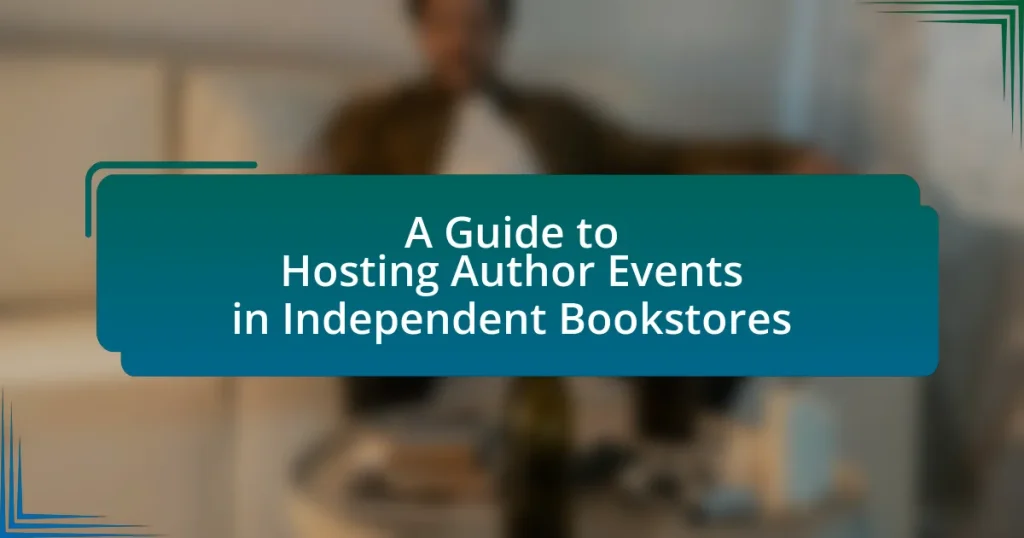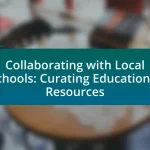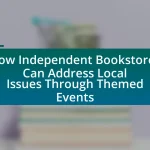Author events in independent bookstores are organized gatherings where authors interact with readers through readings, discussions, and book signings, playing a crucial role in promoting new literature and enhancing community engagement. These events not only increase foot traffic and sales for bookstores but also provide authors with opportunities to connect directly with their audience, fostering loyalty and interest in their work. The article outlines the benefits of author events, types of events that can be hosted, and best practices for planning and executing successful gatherings, including marketing strategies and logistical considerations. Additionally, it addresses common challenges and offers practical tips for maximizing attendance and engagement, ultimately highlighting the significance of author events in the independent bookstore ecosystem.
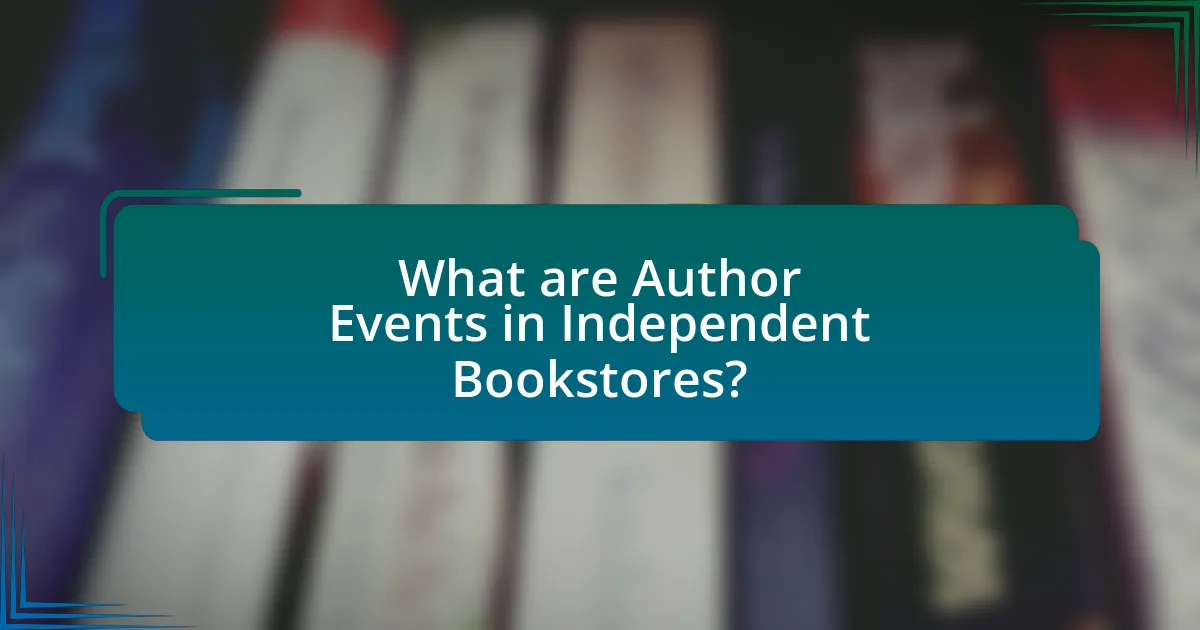
What are Author Events in Independent Bookstores?
Author events in independent bookstores are organized gatherings where authors engage with readers through readings, discussions, and book signings. These events serve to promote new books, foster community engagement, and provide a platform for authors to connect directly with their audience. According to a study by the American Booksellers Association, author events can significantly increase book sales and enhance customer loyalty, demonstrating their importance in the independent bookstore ecosystem.
How do Author Events benefit independent bookstores?
Author events benefit independent bookstores by increasing foot traffic and sales, as they attract both loyal customers and new visitors. These events create a unique experience that fosters community engagement and enhances the bookstore’s visibility. For instance, a study by the American Booksellers Association found that 70% of attendees at author events make a purchase, demonstrating a direct correlation between such events and increased sales. Additionally, author events often lead to social media buzz and word-of-mouth promotion, further solidifying the bookstore’s role as a cultural hub in the community.
What types of author events can be hosted?
Various types of author events can be hosted, including book signings, readings, panel discussions, workshops, and launch parties. Book signings allow authors to engage with fans while promoting their latest works. Readings provide an opportunity for authors to share excerpts from their books, enhancing audience connection. Panel discussions can feature multiple authors discussing themes or topics relevant to their works, fostering dialogue. Workshops enable authors to teach specific skills or techniques related to writing or their subject matter. Launch parties celebrate the release of a new book, often attracting media attention and generating buzz. Each type of event serves to promote literature and connect authors with their audience.
How do author events enhance community engagement?
Author events enhance community engagement by providing a platform for local readers to connect with writers, fostering a sense of belonging and shared interest. These events encourage dialogue between authors and attendees, which can lead to increased participation in community activities and local culture. Research indicates that book signings and readings can boost foot traffic in independent bookstores, creating a vibrant community hub that supports local businesses and promotes literacy. For example, a study by the American Booksellers Association found that 70% of independent bookstores reported increased community engagement through author events, highlighting their role in strengthening local ties and encouraging collaborative initiatives.
Why are author events important for authors?
Author events are important for authors because they provide opportunities for direct engagement with readers, which can enhance visibility and build a loyal fan base. These events allow authors to showcase their work, share insights about their writing process, and connect personally with their audience, fostering a sense of community. Research indicates that authors who participate in events often experience increased book sales and heightened interest in their future projects, as personal interactions can significantly influence readers’ purchasing decisions.
How do author events help in book promotion?
Author events significantly enhance book promotion by providing direct engagement between authors and readers. These events create opportunities for authors to showcase their work, share insights, and connect personally with their audience, which can lead to increased book sales. According to a study by the American Booksellers Association, author events can boost sales by up to 50% for featured titles, demonstrating their effectiveness in driving interest and purchases. Additionally, such events often generate media coverage and social media buzz, further amplifying the book’s visibility and reach.
What opportunities do authors gain from hosting events?
Authors gain significant opportunities from hosting events, including increased visibility, direct engagement with readers, and potential sales boosts. By hosting events, authors can showcase their work to a targeted audience, enhancing their public profile and attracting new fans. Engaging directly with readers allows authors to build personal connections, receive immediate feedback, and foster a loyal community. Additionally, events often lead to increased book sales, as attendees are more likely to purchase books after experiencing an author’s presentation or discussion. According to a study by the Book Industry Study Group, author events can increase book sales by up to 40% in the weeks following the event, demonstrating the tangible benefits of hosting such gatherings.
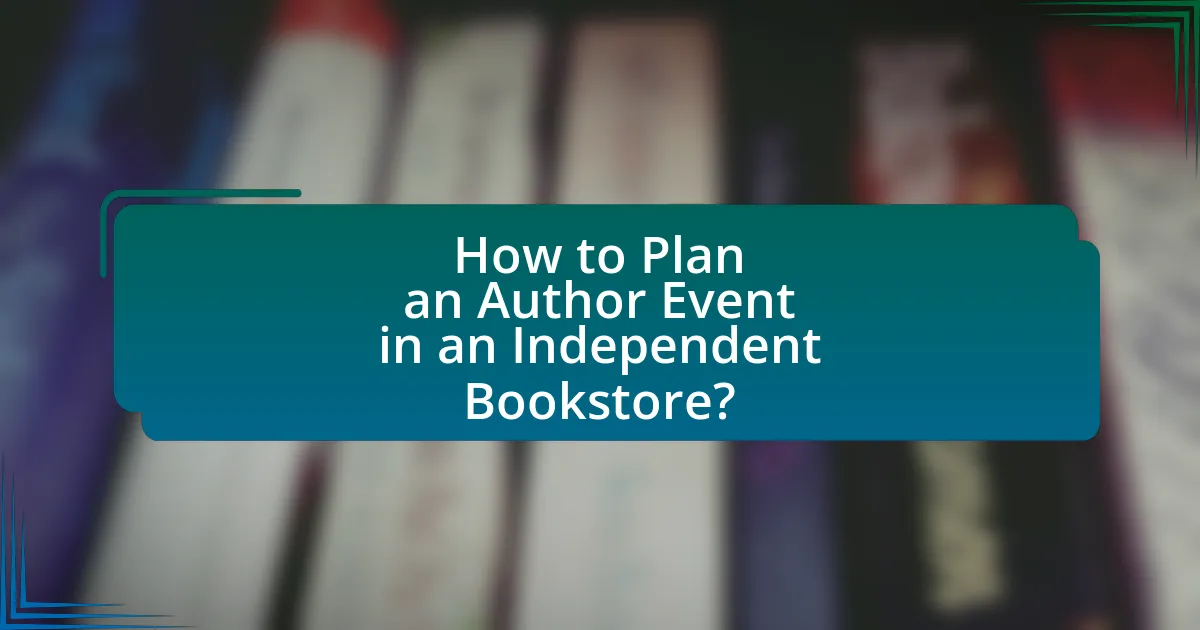
How to Plan an Author Event in an Independent Bookstore?
To plan an author event in an independent bookstore, first, establish a clear objective for the event, such as promoting a new book or engaging with the community. Next, select a suitable date and time, ensuring it does not conflict with other local events to maximize attendance.
Then, coordinate with the author to discuss logistics, including travel arrangements, promotional materials, and the format of the event, whether it be a reading, Q&A, or signing session. Promote the event through social media, email newsletters, and in-store signage to reach potential attendees effectively.
Finally, prepare the bookstore space by arranging seating, setting up a table for the author, and ensuring that books are available for purchase. According to a study by the American Booksellers Association, author events can significantly increase foot traffic and sales, making careful planning essential for success.
What are the key steps in organizing an author event?
The key steps in organizing an author event include selecting a date and venue, promoting the event, coordinating logistics, and engaging with the author. First, choose a suitable date and location that accommodates the expected audience size and is accessible. Next, promote the event through social media, email newsletters, and local community boards to attract attendees. Logistics involve arranging seating, sound equipment, and refreshments, ensuring everything is in place for the event. Finally, engage with the author to prepare for their presentation and facilitate a Q&A session, enhancing the audience’s experience. These steps are essential for a successful author event, as they ensure proper planning and execution.
How do you select the right author for the event?
To select the right author for the event, evaluate the author’s relevance to your bookstore’s audience and the event’s theme. Consider the author’s genre, popularity, and previous engagement success in similar settings. For instance, if your audience enjoys contemporary fiction, an author known for that genre will likely attract more attendees. Additionally, assess the author’s availability and willingness to participate, as well as their promotional capabilities, such as social media presence, which can enhance event visibility.
What logistical considerations should be taken into account?
Logistical considerations for hosting author events in independent bookstores include venue capacity, scheduling, and resource allocation. Venue capacity must accommodate expected attendance to ensure comfort and engagement. Scheduling should consider the availability of the author and potential conflicts with other events to maximize attendance. Resource allocation involves managing promotional materials, seating arrangements, and technical equipment, such as microphones and projectors, to facilitate a smooth event. These factors are critical for creating a successful and enjoyable experience for both the author and attendees.
How can marketing strategies enhance the event’s success?
Marketing strategies can significantly enhance an event’s success by increasing visibility and attracting a larger audience. Effective marketing tactics, such as targeted social media campaigns, email newsletters, and partnerships with local businesses, can create buzz and drive attendance. For instance, a study by Eventbrite found that events promoted through social media see a 20% increase in attendance compared to those that are not. Additionally, utilizing promotional materials like posters and flyers in the local community can further engage potential attendees. By leveraging these strategies, independent bookstores can maximize participation and create a memorable experience for both authors and attendees.
What channels are most effective for promoting author events?
Social media platforms, particularly Facebook and Instagram, are the most effective channels for promoting author events. These platforms allow for targeted advertising, event creation, and community engagement, which can significantly increase visibility and attendance. According to a study by the Pew Research Center, 69% of adults in the U.S. use Facebook, making it a prime venue for reaching potential attendees. Additionally, Instagram’s visual nature is effective for showcasing authors and their works, attracting a younger demographic that is increasingly interested in literary events.
How can social media be utilized for event marketing?
Social media can be utilized for event marketing by creating targeted campaigns that engage potential attendees and promote event details. Platforms like Facebook, Instagram, and Twitter allow event organizers to share updates, create event pages, and utilize paid advertising to reach specific demographics. For instance, a study by Eventbrite found that 62% of event organizers use social media to promote their events, highlighting its effectiveness in reaching a wider audience. Additionally, leveraging user-generated content and encouraging attendees to share their experiences can enhance visibility and engagement, further driving attendance.
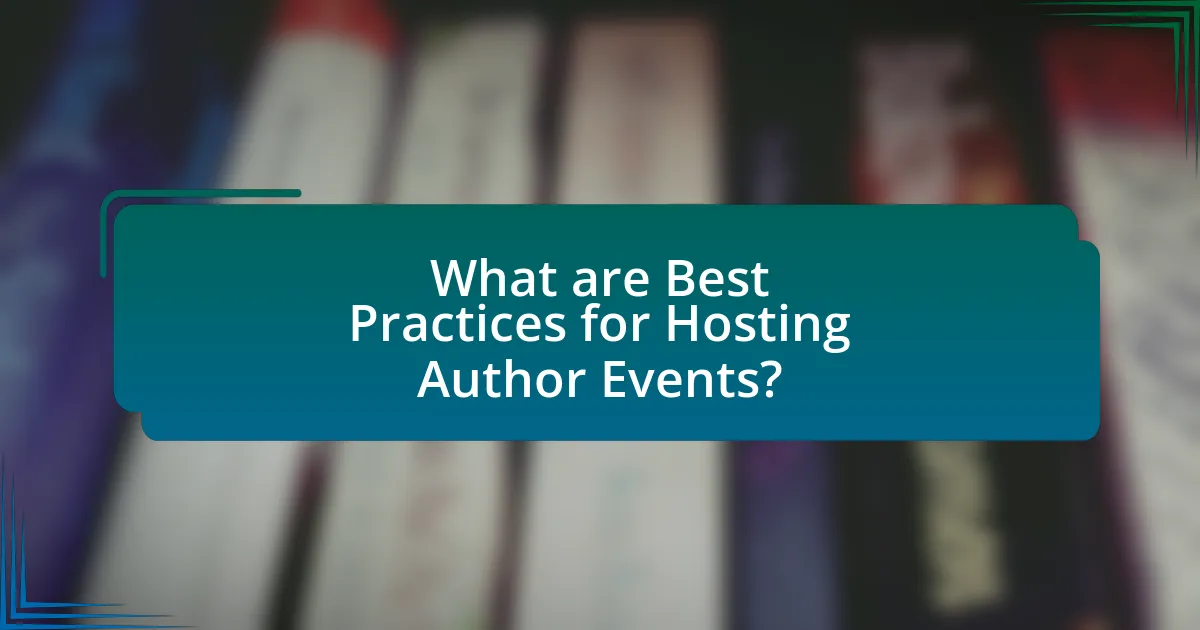
What are Best Practices for Hosting Author Events?
Best practices for hosting author events include thorough planning, effective promotion, and creating an engaging atmosphere. Planning involves selecting a suitable date and time, coordinating with the author for their availability, and ensuring that the venue is equipped with necessary resources such as seating, sound systems, and refreshments. Effective promotion can be achieved through social media, email newsletters, and local community outreach, which helps to attract a larger audience. Creating an engaging atmosphere involves setting up the space to encourage interaction, providing opportunities for audience questions, and facilitating book signings. These practices enhance the overall experience for both the author and attendees, leading to successful events that foster community engagement and boost book sales.
How can you create an engaging atmosphere for attendees?
To create an engaging atmosphere for attendees at author events in independent bookstores, incorporate interactive elements such as Q&A sessions, live readings, and book signings. These activities encourage participation and foster a connection between the author and the audience, enhancing the overall experience. Research indicates that events with interactive components can increase attendee satisfaction by up to 30%, as they feel more involved and valued. Additionally, creating a comfortable and inviting space with appropriate seating, lighting, and refreshments can further enhance engagement, making attendees more likely to participate actively in discussions and activities.
What role does the bookstore layout play in the event experience?
The bookstore layout significantly influences the event experience by facilitating audience engagement and optimizing space utilization. A well-organized layout allows for clear sightlines to the author, encourages interaction among attendees, and creates a welcoming atmosphere. For instance, arranging seating in a semi-circle around the author fosters a sense of intimacy and connection, enhancing the overall experience. Additionally, strategic placement of bookshelves and merchandise can guide foot traffic, ensuring that attendees explore the store before and after the event, which can increase sales and customer satisfaction.
How can you encourage audience interaction during the event?
To encourage audience interaction during the event, implement interactive elements such as Q&A sessions, live polls, and discussion prompts. These strategies actively engage attendees, fostering a sense of participation and community. For instance, a study by the Event Marketing Institute found that events incorporating audience participation saw a 70% increase in attendee satisfaction. By integrating these interactive components, hosts can create a dynamic atmosphere that encourages dialogue and connection among participants.
What common challenges might arise during author events?
Common challenges during author events include low attendance, logistical issues, and author engagement. Low attendance can occur due to inadequate marketing or scheduling conflicts, which diminishes the event’s impact. Logistical issues may involve technical difficulties with sound or presentation equipment, affecting the overall experience. Additionally, author engagement can be challenging if the author struggles to connect with the audience, leading to a lack of interaction and interest. These challenges can hinder the success of the event and reduce the potential for book sales and audience connection.
How can you handle low attendance at an event?
To handle low attendance at an event, increase engagement through targeted marketing strategies. Utilizing social media platforms can effectively reach potential attendees, as studies show that 73% of marketers believe that their efforts through social media marketing have been “somewhat effective” or “very effective” for their business. Additionally, offering incentives such as discounts on books or refreshments can attract more participants. Implementing these strategies can significantly improve attendance rates at future events.
What strategies can be used to manage author expectations?
To manage author expectations effectively, clear communication is essential. Establishing transparent dialogue about event goals, audience size, and promotional efforts helps align the author’s understanding with the bookstore’s capabilities. Setting realistic timelines for event planning and follow-up feedback also aids in managing expectations. For instance, sharing past event attendance statistics can provide authors with a benchmark for what to expect. Additionally, involving authors in the planning process fosters a sense of ownership and can lead to more realistic expectations regarding their participation and engagement.
What are some practical tips for a successful author event?
To ensure a successful author event, effective planning and engagement strategies are essential. First, promote the event through various channels such as social media, email newsletters, and local community boards to maximize attendance. Research indicates that events with strong promotional efforts can see attendance increases of up to 50%. Second, create an inviting atmosphere by arranging comfortable seating and providing refreshments, as studies show that a welcoming environment encourages longer stays and more interactions. Third, prepare a structured agenda that includes a reading, Q&A session, and book signing, as this format has been proven to enhance audience engagement and satisfaction. Lastly, follow up with attendees post-event through thank-you emails or social media interactions to build lasting relationships, which can lead to increased book sales and future event attendance.
